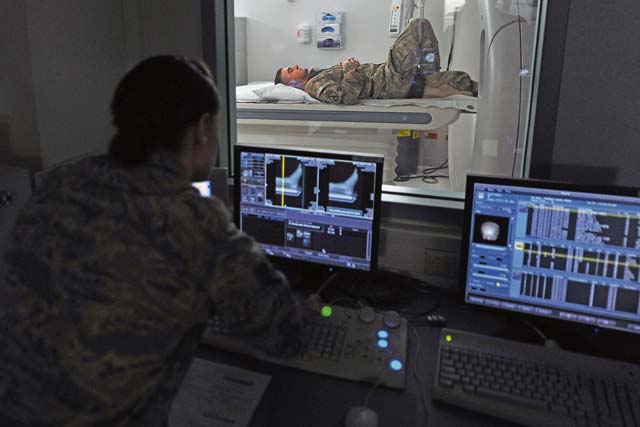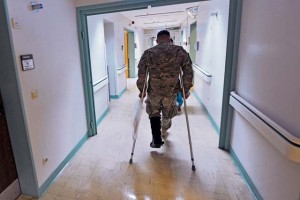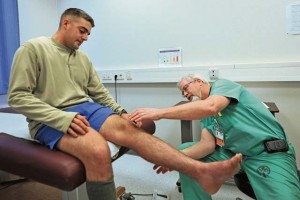
Editor’s note: This is the fifth in a six-part series about medical response capabilities for deployed service members from start to finish and the various milestones for care and transportation of combat-wounded troops throughout Afghanistan. To read Part I, click here. To read Part II, click here. To read Part III, click here. To read Part IV, click here.
Finally, the wounded warrior is out of Afghanistan. The troop is out of harm’s way, but he still needs treatment before heading home. This is when the staff of Landstuhl Regional Medical Center plays a crucial role in the troop’s medical transition from downrange.
In some lucky cases this is the troop’s final treatment, while others will continue treatment stateside. In either case, LRMC will serve as their medical gateway.
LRMC is the largest U.S. military hospital outside of the U.S. and is known for its care of America’s warriors. Whether from Afghanistan, Iraq, Africa, Europe or little known remote sites, military personnel receive world class quality care here.

“A lot of our patients are delivered from the reach missions coming from Afghanistan,” said DeeDee Price, LRMC intensive care unit clinical staff nurse. “After the patients land on Ramstein Air Base they are transported to LRMC, where they will receive treatment or surgery within 24 hours.”
Price has been a nurse at LRMC for many years and has witnessed the hospital at its peak in 2006 to the steady decrease in combat operations and injured troops.
“During the Iraq War we would see burn patients, and then when we transferred toward Afghanistan the focus was on amputees,” Price said. “Fortunately, we have seen a decrease in patients coming over from the reach missions.”
If the patient’s injury is devastating, the hospital works with the service member’s department to fly their family members to LRMC.
“I take care of all my patients as if they were my son or daughter,” Price said. “It makes you feel good in your heart that you can help them get better and home to their family.”
The treatment and care that Price and the LRMC staff provide help get wounded warriors like U.S. Army Sgt. Karl Berlinger back home.
Berlinger was deployed to Kandahar Air Field as a scout. His unit was on its way back to the airfield after a perimeter patrol when they got hit by an improvised explosive device. The IED blew the door inward slamming across Berlinger’s left foot.

“We took a hard hit, almost everyone had some sort of injury from the blast,” Berlinger said.
After a brief stay at Bagram Airfield he was flown to LRMC on a C-17 Globemaster III reach mission. Within one hour at the hospital he was getting treatment for his wounds.
“I was only there for a short time, and they did everything for me all in the same day,” he said. “I appreciate how smooth they have made this transition for me back to the civilian world.”
Berlinger’s wife had just given birth to their second child when he left for Afghanistan. His family went to the states during his deployment but with help from his unit and the staff at LRMC, they will be in Germany to welcome him home.
“When I get home I’m going to hold my wife and my daughter, even with my crutches,” he said jokingly. “I also can’t wait to hold my newborn. She was so tiny when I left and, looking at all the pictures my wife sent, the baby looks like she has grown into a big kid.”
Because of the excellent care and professionalism of the LRMC staff, Berlinger will be home in a couple of days. After hearing the news, Berlinger became ecstatic and began thanking the staff.
“I told them ‘thank you’ for taking care of me and getting me better, so I can go back home soon and be with my family,” Berlinger said.


